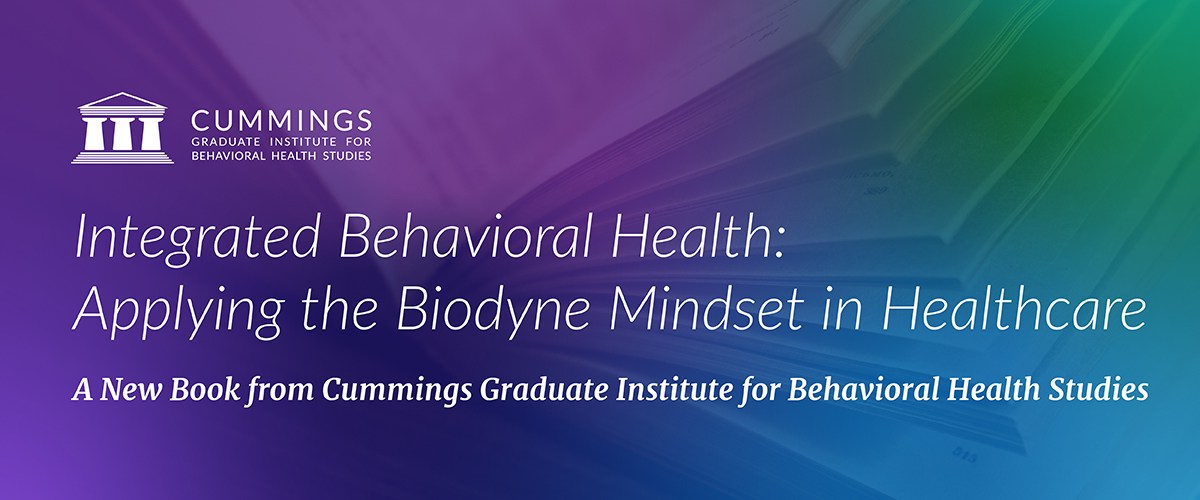 Cummings Graduate Institute for Behavioral Health Studies Announces New Book: Integrated Behavioral Health: Applying the Biodyne Mindset in Healthcare
Cummings Graduate Institute for Behavioral Health Studies Announces New Book: Integrated Behavioral Health: Applying the Biodyne Mindset in Healthcare
Available Worldwide January 2026
October 7, 2024
Cummings Graduate Institute for Behavioral Health Studies (CGI) is proud to announce the upcoming release of the groundbreaking new book, Integrated Behavioral Health: Applying the Biodyne Mindset in Healthcare, set for publication in January 2026. This new book builds on the foundation laid by Dr. Nicholas A. Cummings and Dr. Janet Cummings, renowned psychologists and co-founders of both the Doctor of Behavioral Health (DBH) degree program and CGI, who previously introduced the influential Biodyne Model in their seminal work Refocused Psychotherapy as the First Line Intervention in Behavioral Health.
In the decade since its original release of Refocused Psychotherapy as the First Line Intervention in Behavioral Health, the healthcare landscape has transformed dramatically, particularly in the field of integrated care. Recognizing this evolution, CGI’s students and faculty advocated for a modernized edition of the text to address pressing issues such as shifting population demographics, patient-centered care practices, the growing complexity of chronic illness, and the rising costs of healthcare delivery. Integrated Behavioral Health: Applying the Biodyne Mindset in Healthcare addresses these new pressing issues, ensuring future generations of integrated care professionals are effectively equipped with evidence-based strategies to meet the demands of today’s changing healthcare environment.
 Dr. Janet Cummings shares insight into the significance of the new edition:
Dr. Janet Cummings shares insight into the significance of the new edition:
“The Biodyne Model has never been stagnant. It has always been, and hopefully always will be, a work in progress. Because the model is based on solid research, it must evolve with newer research. The original Biodyne Model was a “carve out” model, where mental/behavioral healthcare was separated from physical healthcare. The current model is an integrated care model, where mental/behavioral healthcare is fully integrated into physical healthcare. As we learn more about such things as mental health consequences of pandemics, systemic racism, and other current social factors, we must continue to update the Biodyne Model accordingly. The need to remain current has driven this updated book.”
Integrated Behavioral Health: Applying the Biodyne Mindset in Healthcare advances the Biodyne Model to reflect the post-pandemic realities of healthcare, health disparities, and emerging trends in patient vulnerability and population health. It also addresses the challenges faced by patients and providers navigating the failings of healthcare systems worldwide. Structured across four sections, the book delivers in-depth analysis and practical solutions.
- Section I provides foundational practices and concepts, including reimbursement and payment models.
- Section II dives into the structural pillars of integrated care, including fresh content on interprofessional ethics, health equity and inclusion, quality measures, and the role of technology and innovation.
- Section III modernizes the Biodyne Model for the current generation of population-based interventions, highlighting critical patient demographics and age groups.
- Section IV concludes with a forward-looking exploration of integrated care, offering reflections and models for the future of integrated care delivery.
Integrated Behavioral Health: Applying the Biodyne Mindset in Healthcare, published by Routledge/Taylor & Francis Group, will be available for purchase at retailers worldwide in January 2026. A must-read for the new generation of interdisciplinary healthcare professionals, leaders, educators, and executives, this book offers a comprehensive roadmap for meeting the needs of whole-person and population-based care, while positioning the patient back at the center of healthcare delivery.
Dr. Cara English, DBH, MA, LAC, CEO and CAO of CGI, discusses the inspiration behind Integrated Behavioral Health: Applying the Biodyne Mindset in Healthcare, the key focus areas of the book, and its potential impact on the field of integrated behavioral healthcare.
The CGI community of students, faculty and alumni are sharing their voices and expertise as author contributors to the book, with Dr. Cara English, DBH, MA, LAC, PMH-C; Dr. U. Grant Baldwin Jr., DBH; and Dr. Ellen Fink-Samnick, DBH, MSW, LCSW, ACSW, CCM, CCTP, CRP, FCM as the editors.
About the contributors:
Chapter leads:
- Dr. Sonya Boone, DBH, MHSA, MSW, LCSW
- Dr. Gayle Cordes, DBH, MBA, MC
- Dr. Janet Cummings, Psy.D.
- Dr. Liliane De Aguiar-Rocha, DBH, BCBA
- Dr. Cara English, DBH, MA, LAC
- Dr. Ellen Fink-Samnick, DBH, MSW, LCSW, ACSW, CCM, CCTP, CRP, FCM
- Dr. U. Grant Baldwin Jr., DBH
- Dr. Ronke Komolafe, DBH, MBA
- Dr. Robyn Napier, DBH, LCSW, MSSW
Authors include:
- Jilian Aesir, M.Ed.
- Dr. Amanda Barnard, DBH, LCSW
- Brandy Biglow, LMHC, NCC, QS, CCTP
- Cory Cannady, BCBA
- Dr. William Chum, DBH, LMHC
- Dr. Allison Earl, DBH, MA, LAC
- Michelle Francis, LCSW
- Dr. Rachel Grimes, DBH
- Dr. Napoleon Harrington, DBH, LPC
- Jeremy Henderson-Teelucksingh, MA, MHR, LPC/MHSP, NCC, CCMHC, CCTPII
- Dr. Heather Jelonek, DBH, LAC
- Dr. Melissa Johnson, DBH, MC, LPC
- Jose Mathew, LCSW, LAC, ACS
- Dr. Kristin McQueeny, DBH, MS, MEd, NCC, LPC
- Dr. Kasia Motylewicz, DBH, BCBA
- Dr. Patrycja Motylewicz, DBH, BCBA
- Dr. Pauline Tolentino Pablo, DBH, BCBA
- Pooja Panesar, BSc, MEd, BCBA, QBA
- Dr. Valeria Parejo, DBH, BCBA, QBA
- Dr. Billie Ratliff, DBH, LCSW, MSW
- Kenneth Roberts, MPS, LPC, LADC
- Dr. Jennifer Rolfes, DBH, MS, MBA
- Dr. Juan Sanchez, DBH
- Dr. Sara Schuch, DBH
- Dr. Diane Scott, DBH, LCSW
About Cummings Graduate Institute for Behavioral Health Studies (CGI)
Cummings Graduate Institute for Behavioral Health Studies is a nonprofit, DEAC-accredited, online post-graduate institution of higher learning offering post-graduate education and training in the field of integrated behavioral healthcare. CGI is focused on meeting the healthcare industry’s need for a highly-skilled workforce to support an integrated approach to addressing patients’ needs. To learn more about CGI, visit, https://cgi.edu/.
Contact Information:
Press contact: Melissa McGurgan, Sr. Director of Marketing at Cummings Graduate Institute for Behavioral Health Studies
Email: melissa@cgi.edu
Website: https://cgi.edu/






























